The Antisemitism Post (tm)
Gotta get the history to know where the tropes live in the discourse today.
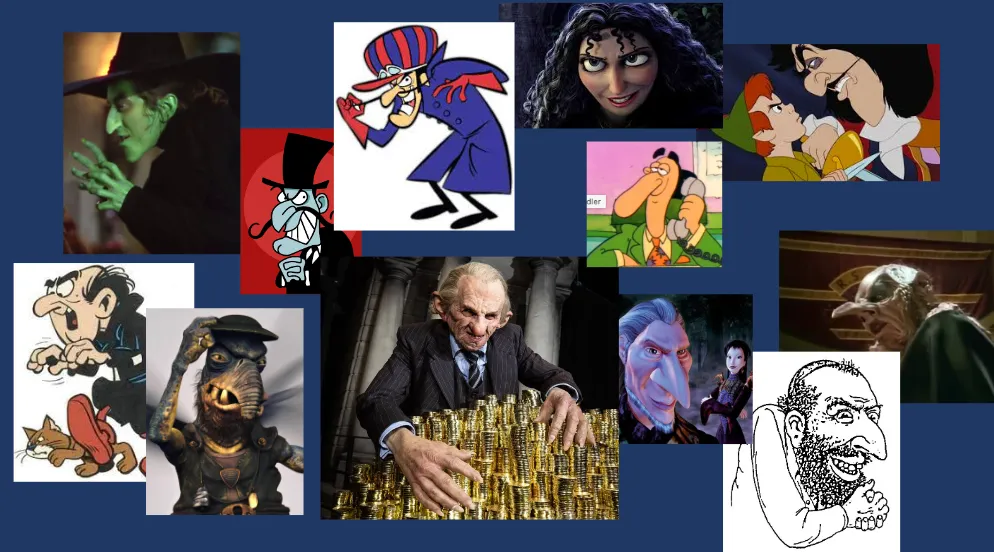
This is Life as a Sacred Text 🌱, an everybody-celebrating, justice-centered voyage into ancient stories that can illuminate our own lives. It‘s run on a nonprofit, so it’s 100% NAZI FREE. More about the project here, and to subscribe, go here:
This is a framework meant to illuminate the longstanding tropes of antisemitism in order to see where they are alive in our discourse today. As I say further down, there are absolutely legitimate critiques of the Israeli government to be made (and I make them, early and often), but being able to separate out political conversation from harmful anti-Jewish tropes is essential. None of this is about diminishing or sidestepping the atrocities experienced by the Palestinian people; for some (but hardly all) of what I've written since 10/7, you can look here, here, here, here, here, here.
So.
Usually, when we talk about coded antisemitism, it looks something like this:

This is a bit from the sitcom 30 Rock (may its memory be for a blessing and episodes streamable forever) and it’s a joke—right?? But why is it funny? And… why is this a joke in the first place? How did this come to be a joke one might tell on prime time network TV in 2006?
This post will talk about this, and a whole lot more.
But in order to do this, we need to go alllllll the way back, first.
A little timeline refresh!
- 63 BCE Rome conquers Judea. (The Hasmoneans/Maccabees weren’t the best at running things.) Early Rabbinic Judaism has likely already begun developing.
- 4 BCE Jesus of Nazareth is born, approximately, according to scholars today.
- 30 CE Jesus is believed to have been crucified.

The process of Judaism and Christianity taking independent paths took a while. At first, Christianity was just another offshoot of Judaism– kind of.
48-50 CE The Council of Jerusalem: Paul, Barnabas James “the Just,” Peter and John conclude that, in fact, non-Jews do not require circumcision (and observance of other mitzvot) in order to convert to Christianity.
66 CE Tensions between the Jews and the Romans finally explode in the form of the Great Jewish Revolt. The Jews try to rise up against the Roman Empire. It… does not go as hoped.
- 70 CE Rome destroys the Second Temple as part of quashing/retaliating against said revolt.
Rabbinic Judaism’s ritual observance outside the Temple system anchors Judaism in the wake of this catastrophe. Judaism lives on.
- 66-110 CE The four canonical Gospels are written.
- 132-135 CE The Bar Kochba Revolt was a last stand attempt by the Jews to get the Romans out of Judea. It ends badly. The Romans kill, enslave, and/or exile much of Judea. Jewish diaspora begins in earnest. [[1]]
I would like you to imagine how you tell a story about your ex during or after a complicated breakup vs. how things were when you were together and everything was great. I would like to invite you to consider the Jewishness of Jesus, and the portrayal of Jews in the Gospels, through that possible lens. (More on all that in the posts at the end of this one.) [[2]]
Then the timeline hits a key date:
- 312 CE The Roman emperor Constantine converts to Christianity.
It is difficult to overstate the importance of this, I think?
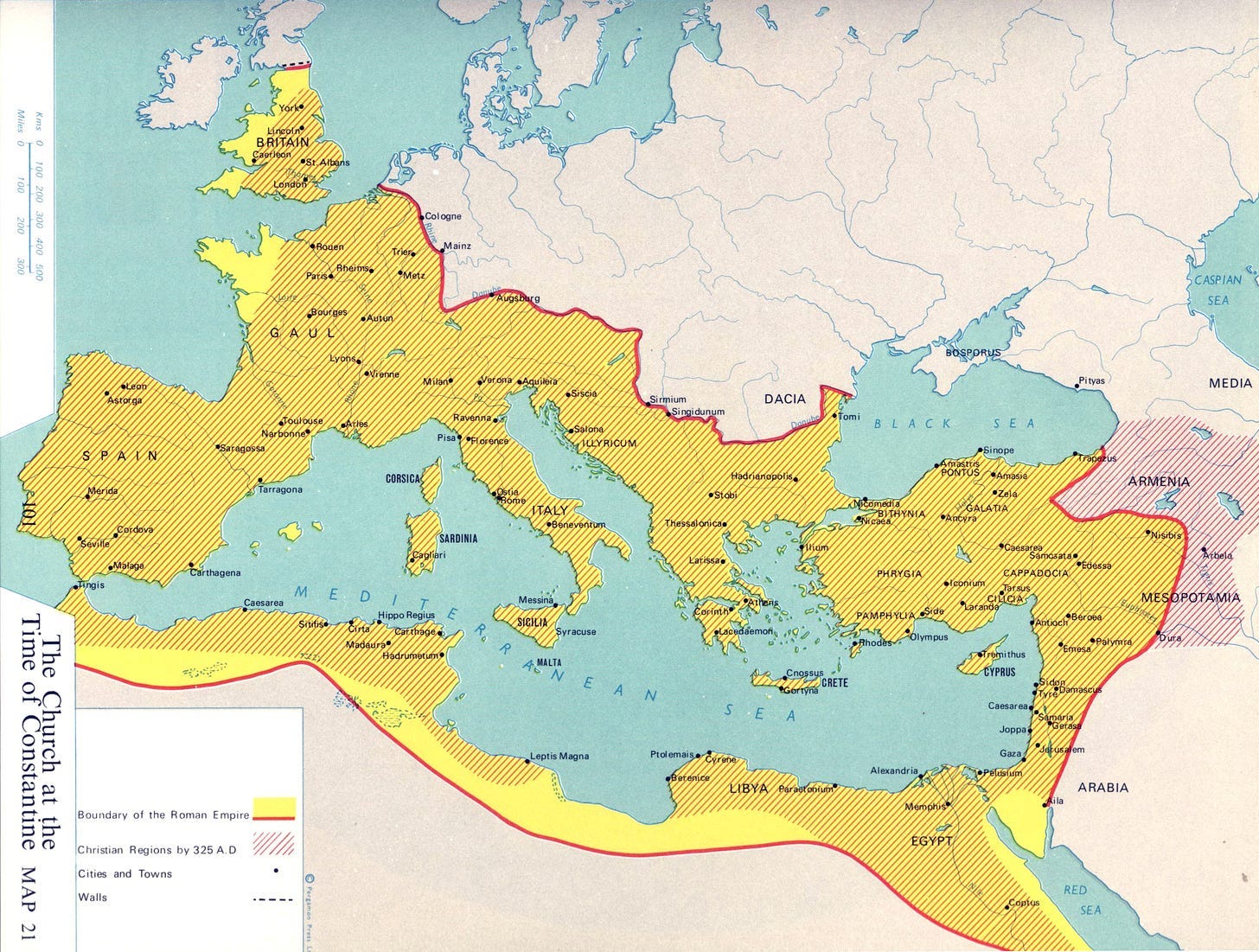
Constantine’s conversion didn’t just Christianize Europe (though it did that, obviously.) Suddenly, with a Christian Roman Empire, it was even less convenient to have a narrative in which... the Roman Empire was responsible for Jesus’ death.
Well, gosh. Who could we blame instead???
👋*jazz hands*👋
This became a Whole Thing for a Long Time. For example, antisemitic Passion Plays—theatrical depictions of the end of the life of, crucifixion, and resurrection of Jesus—were very popular around Easter, and the Jew-blaming in these dramas would be very effective for fomenting anti-Jewish sentiment—which, coupled with Holy Week liturgy sermons that often did the same, meant that Good Friday, like Christmas, tended to be a big time for pogroms.
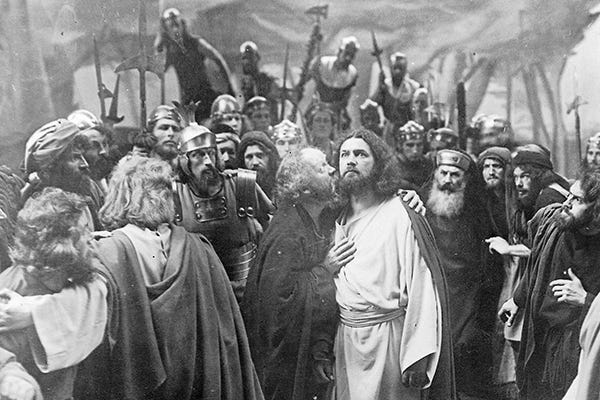
The Middle Ages Were Bad.
The Crusades engendered the mass murder of Jews–horrific pogroms that kicked off with the First Crusades, as French and German locals and knights slaughtered about 10,000 Jews in the Rhineland in 1096–entire communities.
Jews began to be accused of the murder of Christian children, known as blood libels. The earliest was in Norwich, England in 1144.*
Jews were blamed for the Black Death in the 14th c., leading to widespread massacres, including entire communities being burned alive; about 510 Jewish communities were destroyed in this period.

Jews were required to wear a special distinctive, identifying star, badge or hat in many places across Europe, from 1215-to 18th/19th c.
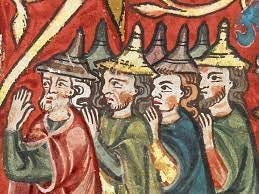
WORLD JEWRY INTERLUDE
(The antisemitic trope still in effect today was born in Europe–which is why we're looking there today–but it's important to remember that Jews are from all over the place, look like every kind of people, and have cultures and histories that're equally diverse.)
About 15% of US Jewry are Jews of Color (which includes some but not all Sephardi or Mizrahi Jews, and also includes Ashkenazi Jews. And that stat includes Jews from all over this map, including Jews whose families are as ancient as they go, Jews from mixed families, Jews by choice or descendants of Jews by choice, and Jews who are Jews by any number of other paths.)
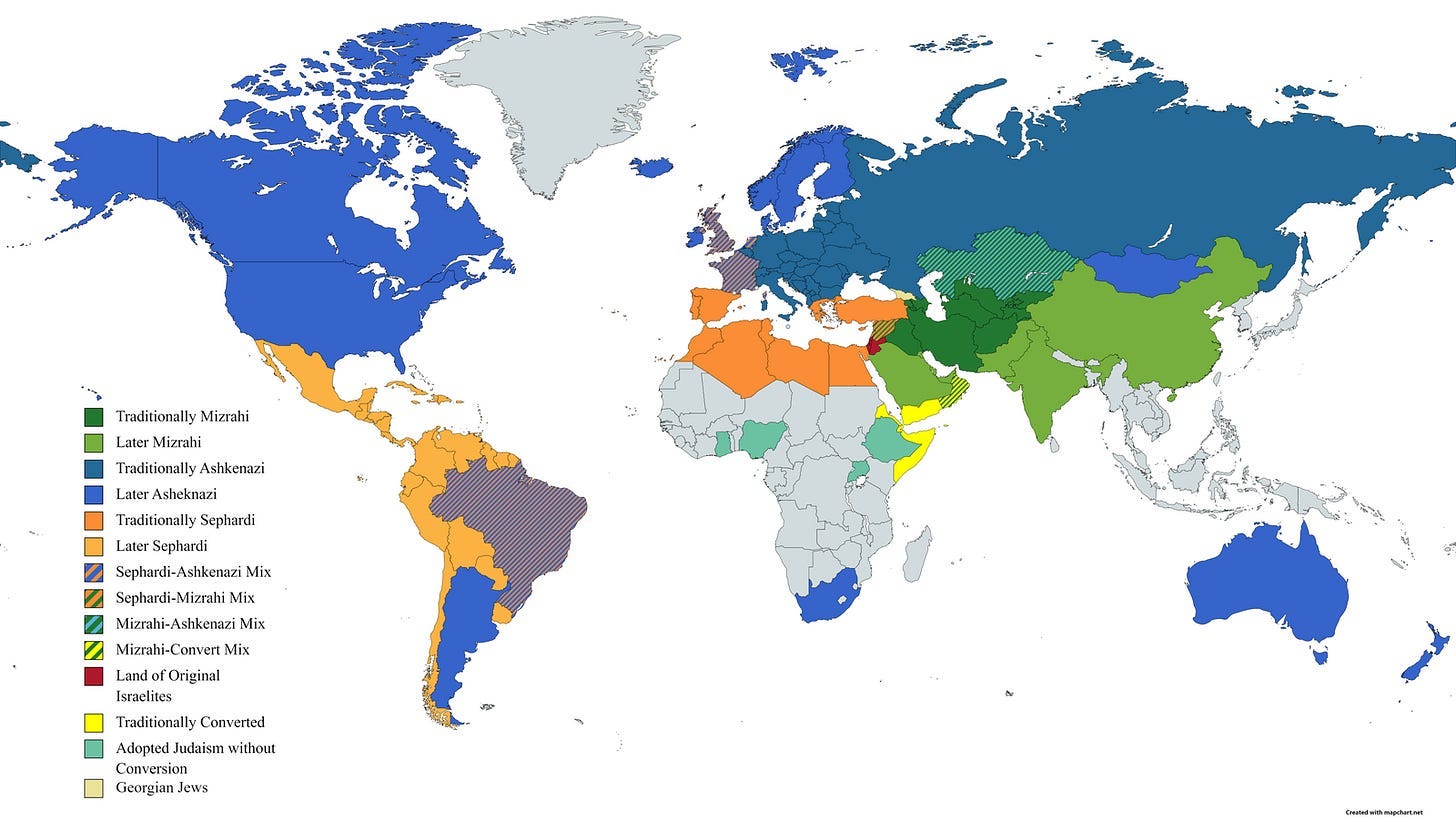
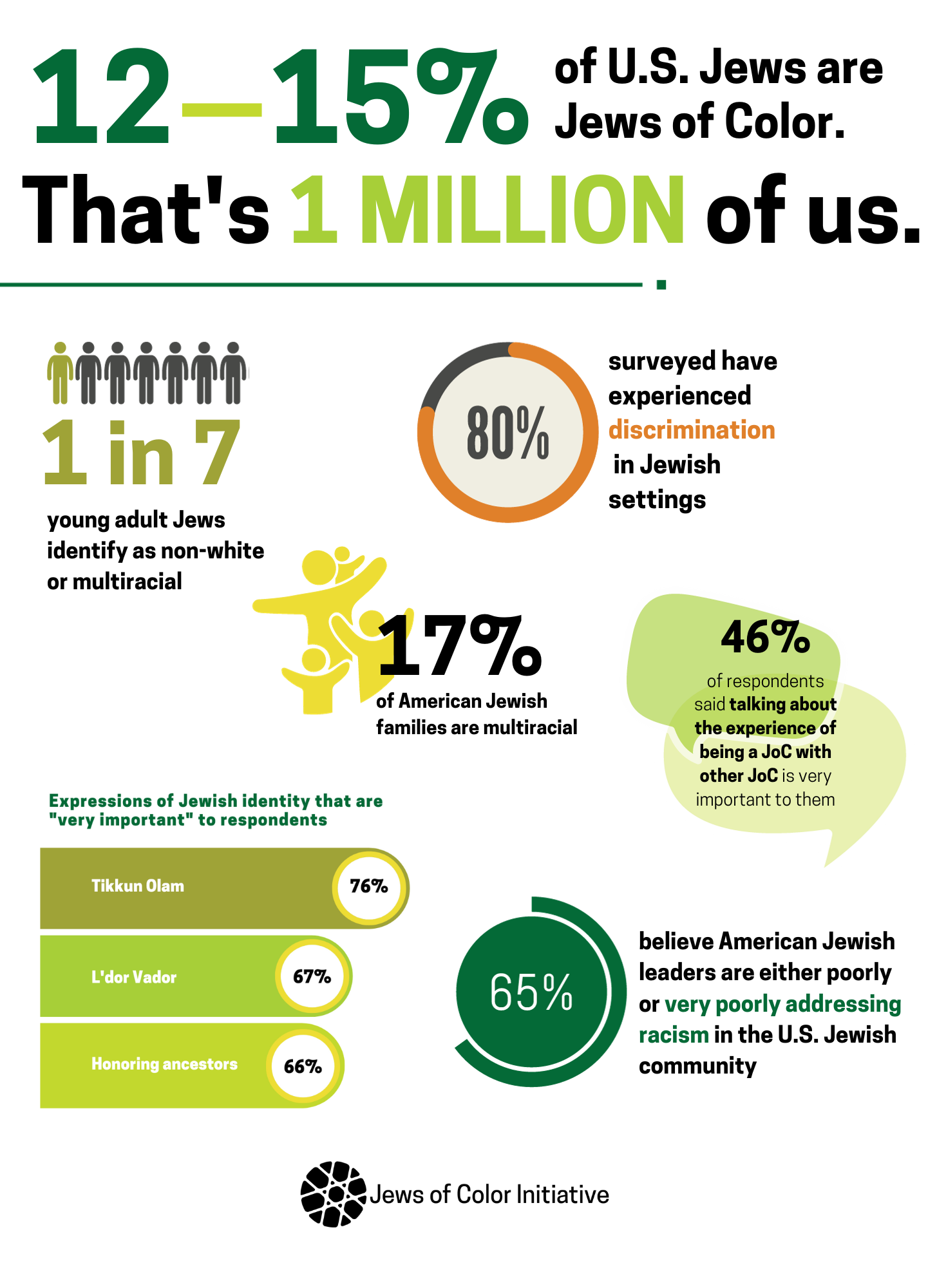
Historian Avi Shlaim was born in Baghdad, raised in Israel and has spent the majority of his adult life in England:
But, again, the trope of antisemitism that is in play today was born in Europe, so that’s why we’re looking there:
So back to medieval Europe:
As so often happens with things like these, anti-Jewish oppression created anti-Jewish stereotypes.
- Jews couldn’t own land in much of Europe, and were also locked out of most trade guilds.
- Jews had to pay special high taxes across Europe, so communities needed real 💰 for survival.
- Lending money with interest was forbidden in Catholicism. Local authorities found it… convenient… to push Jews into work seen as morally repugnant. And banking was kinda (🤷) in Judaism. Frankly, we didn't have much choice:
"If we nowadays allow interest to be taken from non-Jews, it is because there is no end to the yoke and the burden king and ministers impose on us, and everything we take is the minimum for our subsistence, and anyhow we are condemned to live in the midst of the other nations and cannot earn our living in any other manner except by money dealings with them; therefore the taking of interest is not to be prohibited." (Tosafot to Talmud Bava Metzia 70b. 11th-13th c. France/Germany)
- So Jews lent money, collected rents, engaged in trade, and did other kinds of urban work from the ghettos in which they were forced to live, often whatever work they could pull together.
Even though a small subset of Jews engaged in moneylending, and were pushed into it for economic survival, Jews were stereotyped as greedy, blood-sucking usurers. And sometimes Christians would confuse their contemporary neighbors with the moneychangers described in the Gospels whom Jesus chased away from the Temple.*
*Never mind that the issue in the Gospel stories was not that they were Jews who helped pilgrims change to the local currency, but that they were people who happened to be cheaters.
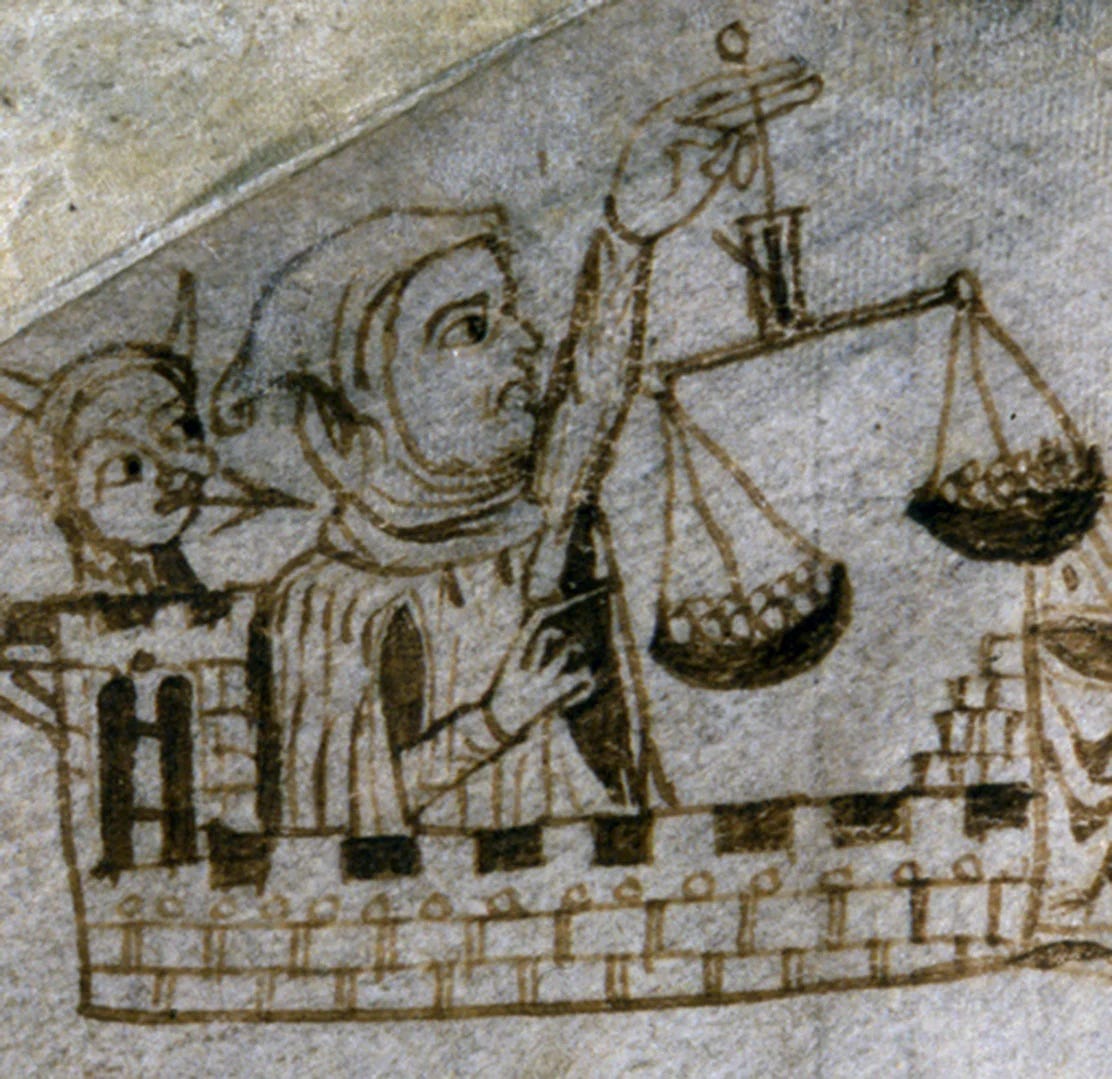
Jewish money lender “doodle” in the margin of an English royal tax record from 1233, Satan or a demon helpfully by his side, assisting in this oh-so-well-regarded work. Sometimes considered part of the first anti-Jewish caricature. And so the dynamic began. It was all too easy.
Whenever things went down, people in power had a ready scapegoat there.
An ethnic/religious/racial other* who is despised both for—as the story goes—killing Jesus, and for being increasingly connected to greed, money, sin. [[3]]
Something goes wrong? [[4]]
Those in charge could cry:
Blame the Jews, not me!
Jewish Studies scholar Mika Ahuvia notes,
“Economists have correlated … expulsions with times of economic downturn, because of poor weather conditions, corruption, or plagues. Whenever things were going badly and leaders needed a scapegoat, it was useful for them to blame and expel Jews from their cities as a way of ‘taking action.’”
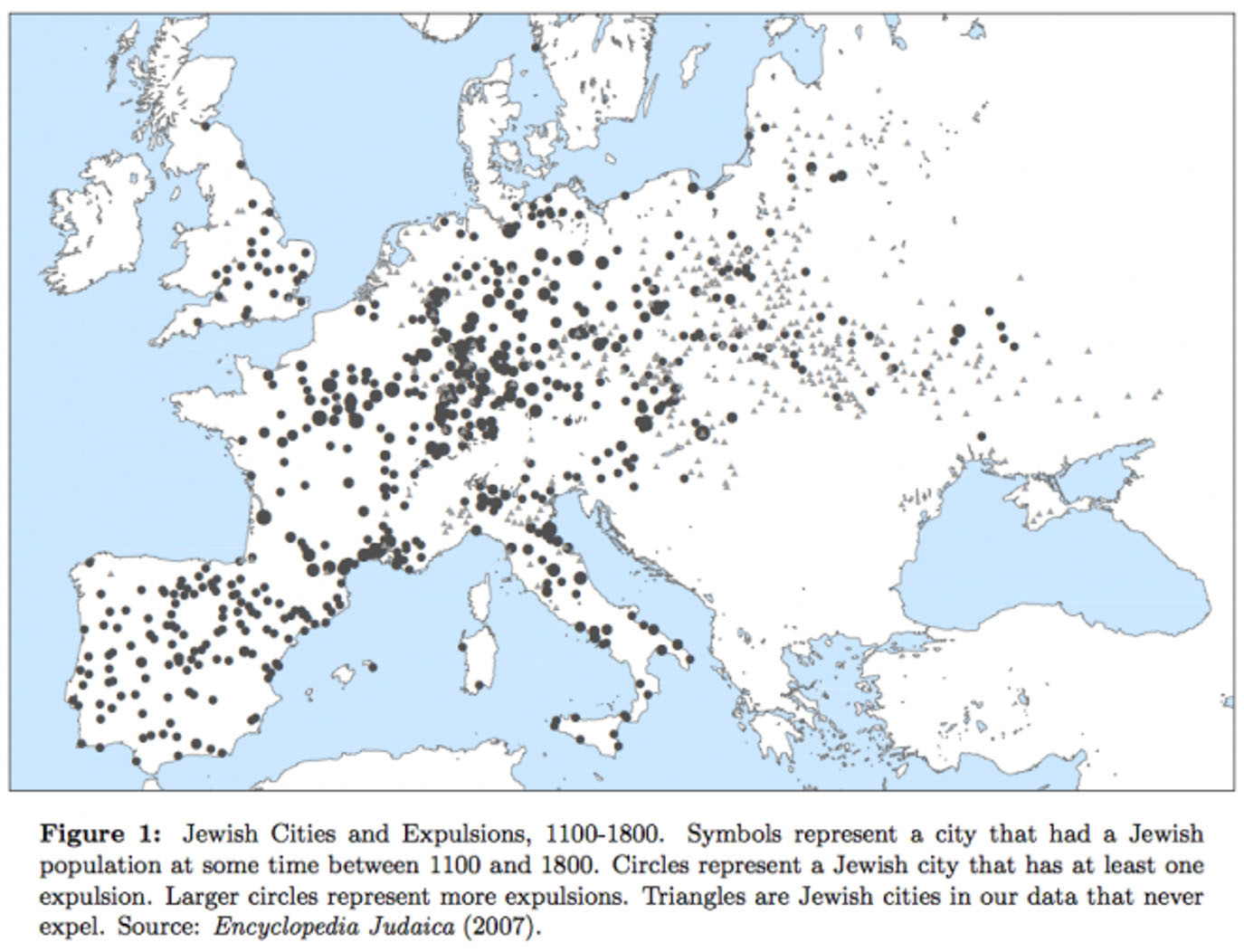
Map of Europe that says Jewish Cities and Expulsions, 1100-1800, with lots and lots of dots representing all the places Jews got kicked out of. Lotta dots from England and Spain through Germany and well into Eastern Europe 
The Belgian town of Aalst still has a Mardi Gras carnival (or did at least until 2020 or so) featuring copious antisemitic caricatures, just “for fun.” 
Another very very fun! image from the Aalst carnival At the end of the 19th c., as anti-Czar sentiment was fomenting—yep, people mad at the ruling party— so the Russian Czar’s Secret Service created the Protocols of the Elders of Zion.
It was the same trope, but now they ratcheted things up a notch.
Now we're talking about a secret global cabal.
This was antisemitic propaganda (blame the Jews, not the Czar!) about a secret ring of Jews who were plotting to rule the world by manipulating the economy, controlling the media, and fostering religious conflict, all behind the scenes.
This is the prototype for a key antisemitic trope today.
The Czar: the gift that keeps on giving.
In the 1920’s, Henry Ford got his hands on an English translation of Protocols and spread it, and many other antisemitic lies, throughout the US via his paper, The Dearborn Independent.
ALL FOR THE PURPOSE OF SUPPORTING AN INNER CLIQUE OF GREEDY JEWS IN EXTRAVAGANT LUXURY. HOW WELL THEY MUST HAVE SERVED THEIR MASTER, THAT CLOWN WHO WOULD BE KING, THE DEVIL. (Did you ever hear of anything so incredibly ridiculous? I certainly could not even imagine that any race of HUMANS could be so unbelievably dense.) After accumulating the wealth of the world, the next thing which the money-mongers had to decide was what to do with this accumulated wealth of the world. How to make it secure, and make it bring interest forever? The answer is Socialism, Bolshevism, Sovietism. The magic formula is government ownership, management and control of everything by a paternalistic Autocracy. Russia is the first outstanding and wretched example. Which will be next? In perfect accord with The Protocols, the Jews are borrowing and bonding the unsuspecting Russian people into an inhuman robot- peonage which is to be a comparative hell alongside (etc) "The Protocols" WITH PREFACE AND EXPLANATORY NOTES The possession of these documents in Soviet Russia is punishable by immediate death. WHY? EVERY PATRIOTIC AMERICAN MUST READ THESE PROTOCOLS Issued by THE PATRIOTIC PUBLISHING CO. (NOT INCORPORATED) P. O. Box 526 Chicago, Ill. How can antisemitism seem so invisible?
“Partly it’s that it allows Jews success. Many oppressions rely on keeping a targeted group of people poor, uneducated, designated non-white, or otherwise ‘at the bottom.’ Anti-Jewish oppression doesn’t depend on that. Although at many times it has kept Jews in poverty or designated non-white, these have been “optional” features. Because the point of anti-Jewish oppression is to keep a Jewish face in front, so that Jews, instead of ruling classes, become the target for peoples’ rage, it works even more smoothly when Jews are allowed some success and can be perceived as the ones ‘in charge’ by other oppressed groups.” –April Rosenblum, The Past Didn’t Go Anywhere (2007)
And so a trope is born:
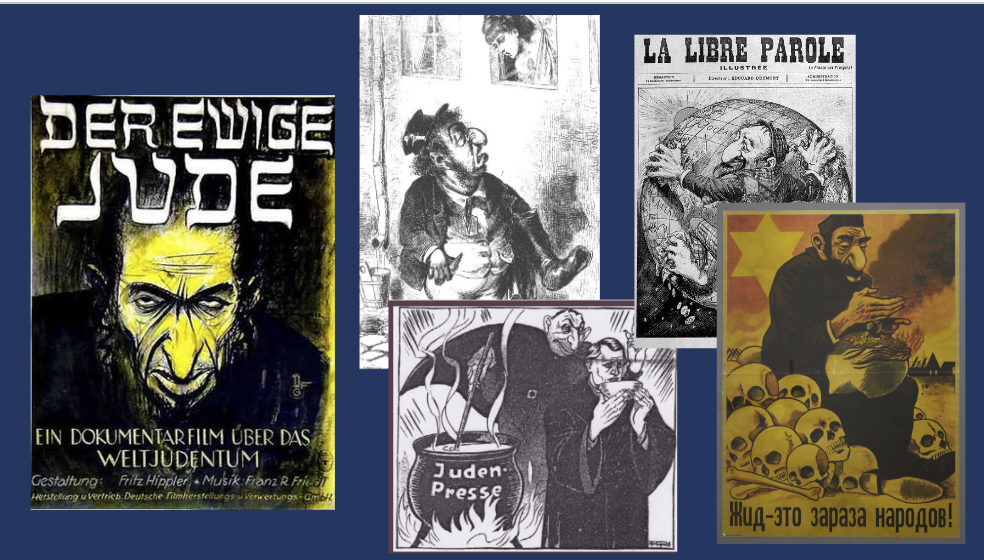
From left: Poster for "The Eternal Jew," a 1940 Nazi propaganda film presented as a documentary; antisemitic caricature shortly after the 1873 Vienna stock exchange crash-- the woman is surprised that this Jewish "Baron" has been reduced by the crash to a street vender; Der Stürmer, 1932, The Jewy Devil's potion's made in a caldron labeled, “Jewish Press” (because we run the media, dig? hahaha); Antisemitic caricature of a shabby Jew grasping the whole world in the French La Libre Parole in 1893, a year before the Dreyfus Affair would begin; "Jews- A People of Contagion!" Nazi-produced for Russian readers, 1943. … and continues, insidiously…
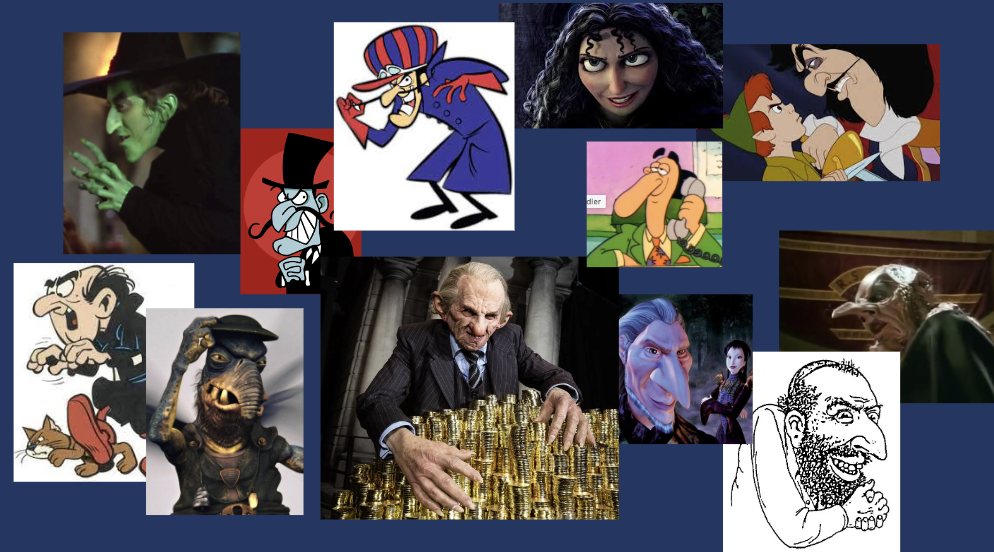
The Wicked Witch of the West! Gargamel from the Smurfs! Watto from the awful Star Wars prequels! Snidley Whiplash! Dick Dastardly! Harry Potter goblins! Mother Gothel from Tangled! Al Swindler from Garfield! Rothbardt from the critically acclaimed Barbie Swan Lake! Captain Hook's hook nose! Anjelica Houston in Roald Dahl’s The Witches (which is antisemitic af)! A cute, totally neutral drawing that I've been sent many times on Twitter! Oh, Kanye. Lifting up as a famous recent-ish example of the conspiracy theory thing, but a reminder that Black people are, as with everything else, held to 9000x the standards that white people are--would that past president or current Speaker of the House--people with significantly more positional power-- were met with the level of outrage from our community that this one musician got. Whenever you see antisemitic harm you have to remember to remind yourself: "Jews, instead of ruling classes, become the target for peoples’ rage," as Rosenblum said.
Am I looking at the rage of "people," or "ruling classes"?
How much social or positional power does the person in question have? How strategic is their antisemitism, vs. speaking from a place of ignorance? What's the function of this harm, and, as such, what will be my choice in how I respond to it?
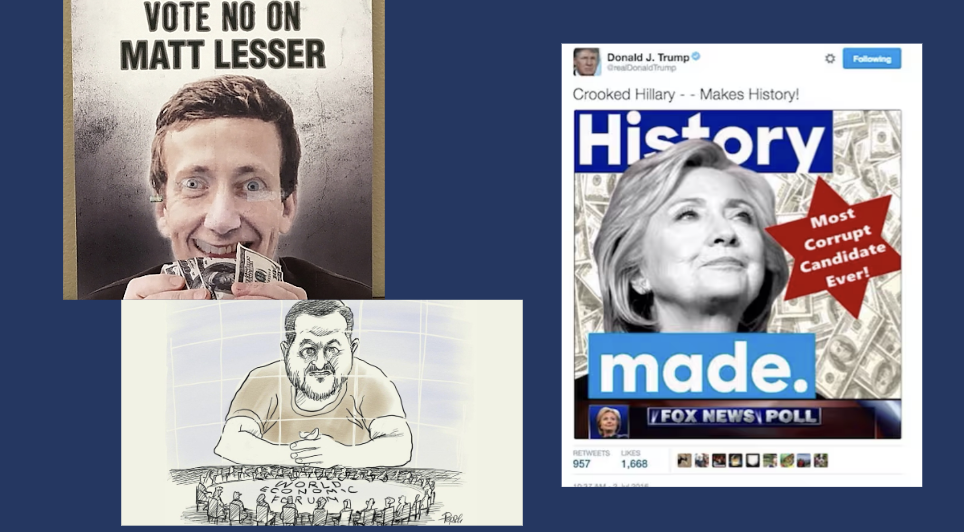
A campaign mailer sent by a GOP CT state senate candidate in 2018, depicting his Jewish opponent gleefully clutching fistfuls of $100 bills; a political cartoon of the Jewish president of Ukraine, Volodymyr Zelenskyy, zooming into the World Economic Forum with that "sinister global overlord" vibe, and of course the Trump tweet with Secretary Clinton and the money/corrupt/Star of David thing. The brilliant Eric Ward, an expert on authoritarian movements, wrote an iconic piece called "Skin in the Game: How Antisemitism Animates White Nationalism.” In it, he articulated a key issue:
The successes of the civil rights movement created a terrible problem for White supremacist ideology. White supremacism—inscribed de jure by the Jim Crow regime and upheld de facto outside the South—had been the law of the land, and a Black-led social movement had toppled the political regime that supported it. How could a race of [ostensible] inferiors have unseated this power structure through organizing alone? For that matter, how could feminists and LGBTQ people have upended traditional gender relations...? How do you explain the election of a Black president? Some secret cabal, some mythological power, must be manipulating the social order behind the scenes. This diabolical evil must control television, banking, entertainment, education, and even Washington, D.C.” – Eric Ward, “Skin in the Game: How Antisemitism Animates White Nationalism”
Rothchild? Soros? Same as its ever been, even as the narrative evolves (to be even more insulting to those leading their own justice movements):
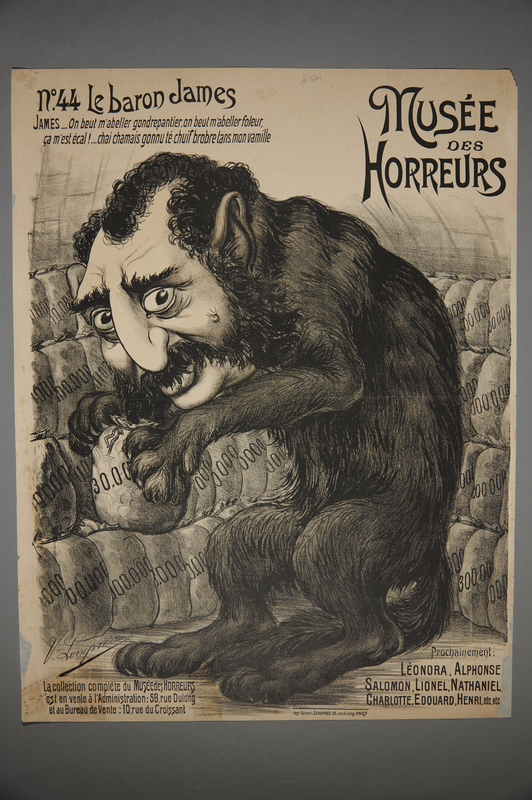
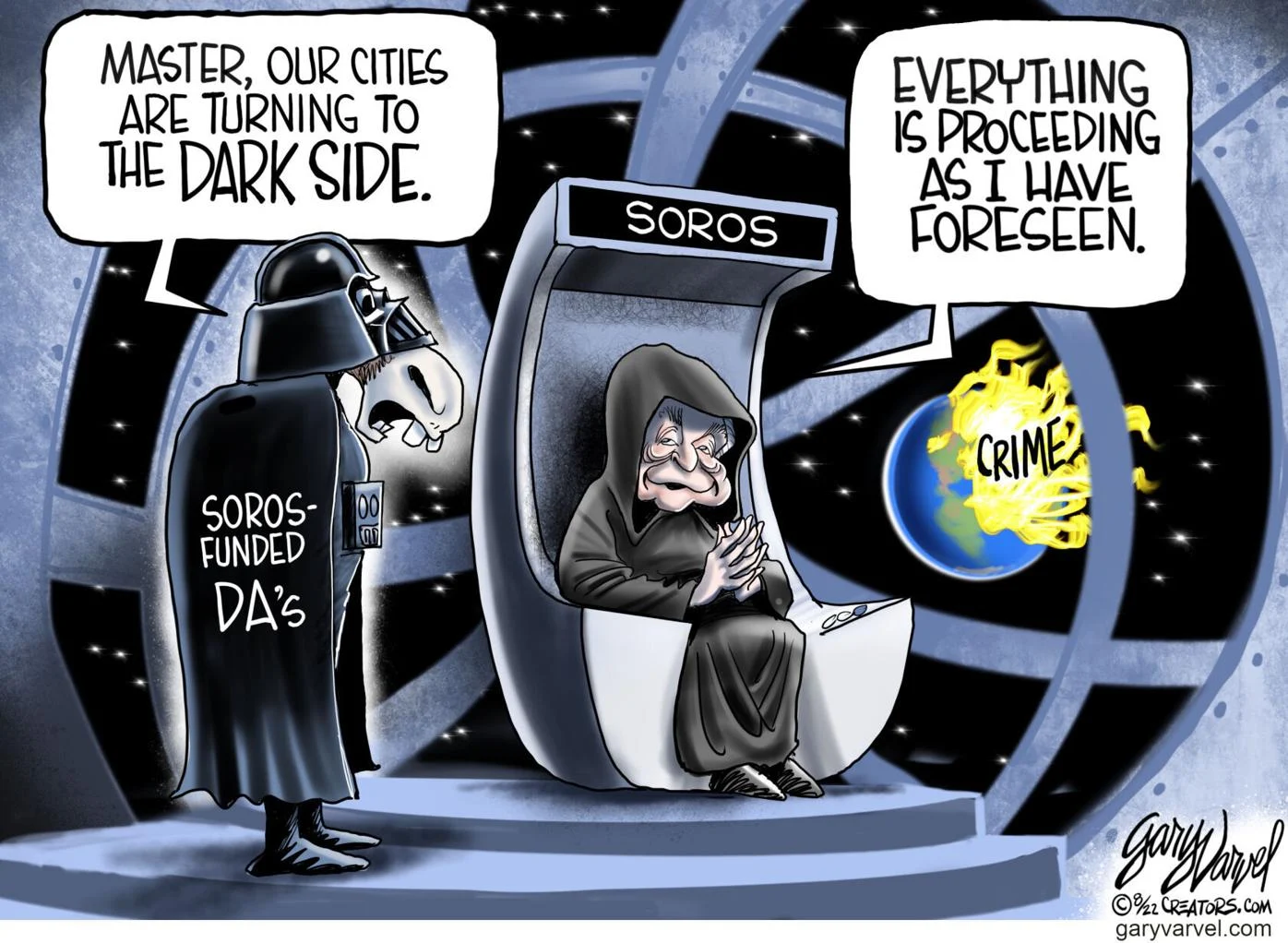
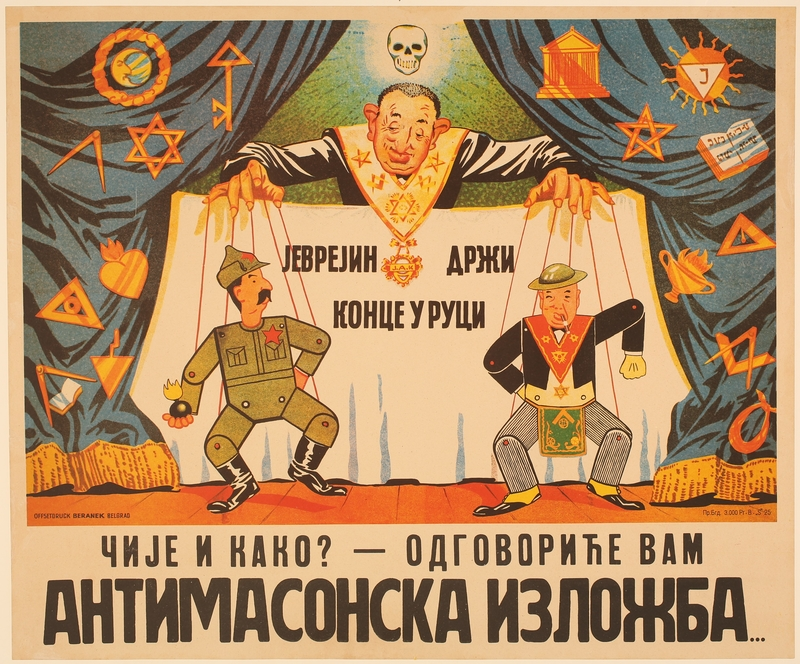
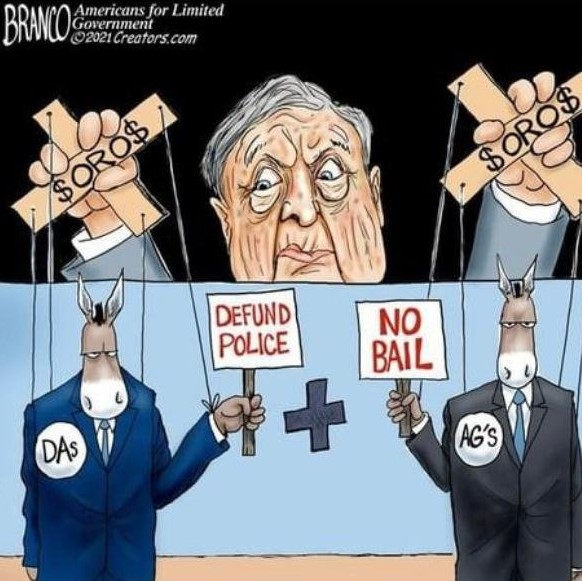
From top left: Poster with a caricature of Baron James de Rothschild with his face on the body of a crouching dog hoarding sacks of money, post-Dreyfus Affair, ca.1899-1900. Crouching Soros as Palpatine with his "Soros-funded DA's" helping explode Earth via crime, cool, cool, not racist at alllllll. Bottom left: Anti-Jewish poster from German occupied Serbia in 1941 with smirking Jewish puppeteer operating marionettes resembling Stalin and Churchill. Soros as puppeteer manipulating DAs and AGs with a "defund police" and "no cash bail" agenda. which of course 🙄 they never would have gotten to on their own.




I could go on forever with this but-- one of the favorite talking points of the transphobes is that Jews are behind trans rights (I mean, I sure am, and a lot of us are, but there's no conspiracy, tyvm) and there's even a twitter account that used to trace the connections between transphobia and antisemitism. Couldn't not include a couple of the "paid Soros protesters" talking points; still waiting on my check to come in. And the antivaxxers going straight for the blood libel language ("elites!").
Part of the power of antisemitism is in the ways that it is not named directly.
This both allows for plausible deniability, as well as mutability–which is how Jews wind up held responsible for both communism and capitalism, often simultaneously. For example, one hears about:
- New York Values
- The Deep State
- Globalists
- Financiers
- International bankers
- Cosmopolitans (rootless, sometimes)
- Coastal liberals
- The Lizard People
- Cultural Marxists
- The Cabal
- Intelligentsia
- Media elites
- Illuminati
- The people running Hollywood
- ((( )))
- Woke Ivory tower types
... yeahh...
So, to revisit that 30 Rock joke.
funny ha ha ? White Jews and Conditional Whiteness: Some History and Context:
- When (white, primarily Ashkenazi) Jews got to the U.S., we were coded as racially “other” initially. There was both systemic discrimination and bias; antiblack "racial covenants" in housing often also barred Jews; Jews were discriminated against in employment; in tightened quotas on enrollment and teaching in colleges and universities. Restaurants, hotels and other establishments barred Jews from entry.
- This changed with the G.I. Bill, which offered significant financial benefits and educational opportunities for returning WWII veterans. Jews benefited from it in a way that Black veterans did not, as Jim Crow laws, redlining, discrimination in education, and other structural barriers continued to exist for Black Americans.
- The US social framework of whiteness began to expand to include white-skinned Jews at this time, and Jews began to reap the structural benefits of whiteness.
- This intensified after the Civil Rights Act of 1964, which forbade discrimination against “creed” as well as against race.
- White supremacists do not see Jews as “white” and target Jews for their Jewishness, and/though white Jews today reap profound benefits of whiteness in an antiblack society; we enter spaces like the hospital, the school, and encounters with police as white, we have been able to accumulate inherited wealth since at least the G.I. Bill, and income injustice tips in our favor.
It is all both/and.
Also…
- Jews who are marked more visibly as Jews by clothing, hair, etc. experience more anti-Jewish hatred.
- White privilege means that the option to change clothes, cover a yarmulke with or tuck sidelocks (peyos) into a baseball cap would change that. (And nobody should have to do this!) This is why we talk about conditional whiteness.
- Again, again, again: Some Jews are Black, Latine, Indigenous, Asian, Asian-American, Arab/Mizrahi, biracial, and more. Not all Jews are white, and not all Ashkenazi Jews are white. (About 15% of the American Jewish community is comprised of Jews of color.) So we must be inclusive in our language and thoughtful about the ways in which racism and antisemitism impact Jewish communities.
Conditional Whiteness:

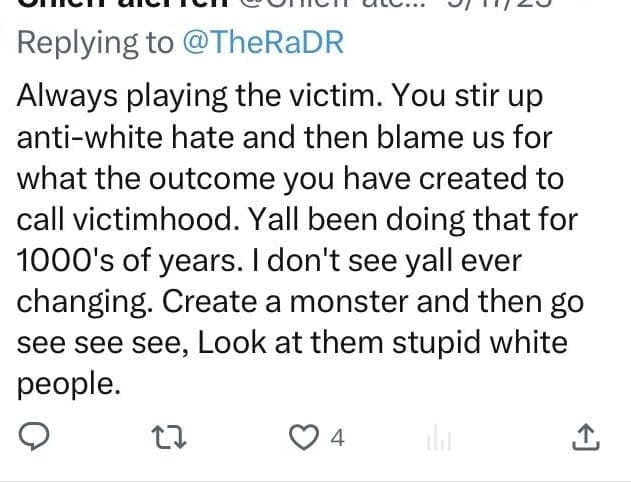

Three tweets I got last year from Twitter's most charming denziens, reminded me helpfully why I left the joint. (I'm on Bluesky now, btw!). Once again, apologies to those who rely on alt-text, it's not that crucial, it's just a few terrible people telling me that I'm not white in some nasty ways in response to some tweet in which I called white Jews: "white Jews." 🤷
The Israel Conversation.
(aka: This Post Is Not Primarily About This)
There is room for challenging conversation and debate around Israel; criticism of Israel and anti-Zionism are not inherently antisemitic.
It is also true that criticism of Israel is sometimes weaponized as a cover for antisemitic beliefs and actions.
Jews are often held to different standards than their non-Jewish counterparts with regards to their relationships to and opinions on Israel, particularly in spaces that do not involve work on Israel. Holding Jews to political standards not otherwise required for non-Jews, or demanding that they pass some sort of political litmus test is misinformed and damaging.
It's also important to remember that just as we thoughtfully separate the actions of the American government and systems from the beliefs of all Americans ("Oh, you're from the US– that means you support the school-to-prison pipeline, obviously.")–that, so, too, do we not implicate individual Israelis in the actions of their government, especially given that support for Bibi is at like 15% right now.
Members of Women Wage Peace, a 50,000-strong grassroots org of Jewish Isareli and Palestinian citizens of Israel-- which lives in partnership now with Women of the Sun, a grassroots peace org made up of woman in the West Bank and Gaza. (They can and should, I believe, be part of peace negotiations.) Sign reads, "Until here! (aka, "Enough!") "Don't decide without women." 
Standing Together is another great grassroots Jewish Israeli + Palestinian Citizens of Israel-led group that has been doing great work for the last few years. The banner says, "Agreement now," referring to the urgent need for a ceasefire in Gaza and a permanent political solution in its place. A recent-ish survey indicated that approximately 1 in 5 college students “sometimes” or “often” hide their Jewish identities in campus. settings. Seniors are more likely than freshman to indicate that they sometimes “feel unsafe” as a Jewish person on campus and are more likely to sometimes hide their Jewish identity than freshmen are. Graphic by the wonderful Liz Sohyeon Kleinrock, author a forthcoming children's book on antisemitism-- keep your eyes peeled. Last year, Public Religion Research Institute and the Brookings Institution found that more than half of Republicans believe the country should be a strictly Christian nation, either adhering to the ideals of Christian nationalism (21%) or sympathizing with those views (33%). The survey also found correlations between people who hold Christian nationalist views as well as those that are patriarchal, antiBlack, anti-im/migrant, anti-Muslim, and antisemitic. [[5]] Hopefully it doesn't need to be spelled out how this agenda is being enacted in real life, on real people's bodies.
Solidarity is the only way home — for all of us.
It's the only way home here, in the US, where Christian nationalism is on the rise and we must all work together to safeguard our collective access to democracy, freedom, human rights, civil rights, and a future that protects everyone– especially those most marginalized by the current oppressive systems.
It's the only way home in Israel/Palestine, where 14 million people have nowhere else to go, nowhere else they call home- and where only a shared political solution, a mutual commitment to justice, to liberation, to peace, and to repairing all that which can be– and acknowledging the debt of that which cannot– can lead to a more whole tomorrow.
We must all find our way together.
And part of that work involves being able to see one another in our full humanity, beyond deeply ingrained stereotypes and baggage.
🌱
Like this? Get more of it every week.
For free every Monday—sign up at the ‘Subscribe now’ button just below.
And if you become a paid subscriber, you get tools for deeper transformation, a community, and support the labor that makes these Monday essays happen.
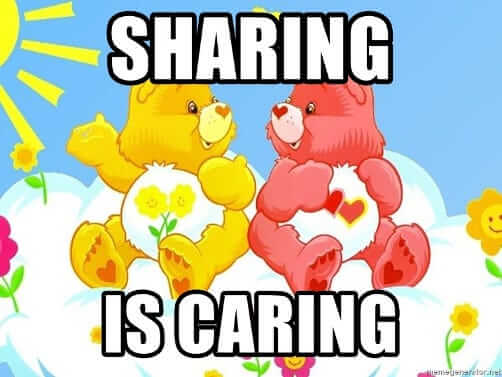
Especially without Substack's built-in network, word-of-mouth– forwarding emails, sharing on social media, etc– matters more than ever.
Please spread the word about this post and Life is a Sacred Text in general.
Thank you. 🙏 ❤️A note on the subscription model:
I want my work to be as accessible to as many people as possible, in as many ways as possible. That's why the Monday essays are free, and why we donate subscriptions to anyone for whom paying is a barrier to the House of Study posts.
I also believe people should be paid fairly for their work. Needless to say, these two values sometimes seem to be in conflict, but I do what I can to find a fair balance. I offer many resources for free, and charge for others. When you donate generously or pay at the top of our scale, that helps support the work I do, provides access for those who have fewer resources, pays for the infrastructure and the technical and practical support that it takes to do this, and helps us keep the work sustainable.
And as always, if you want in to the Thursday space but paying isn't for you now, just email support@lifeisasacredtext.com and we'll hook you up.
And if you’d like to underwrite one of these donated subscriptions, you can do so by signing up at one of the higher subscription points.
And if it resonated with you, please share this post.
Sending a big pile of blessings and goodness your way. 💕
BONUS THINGS!
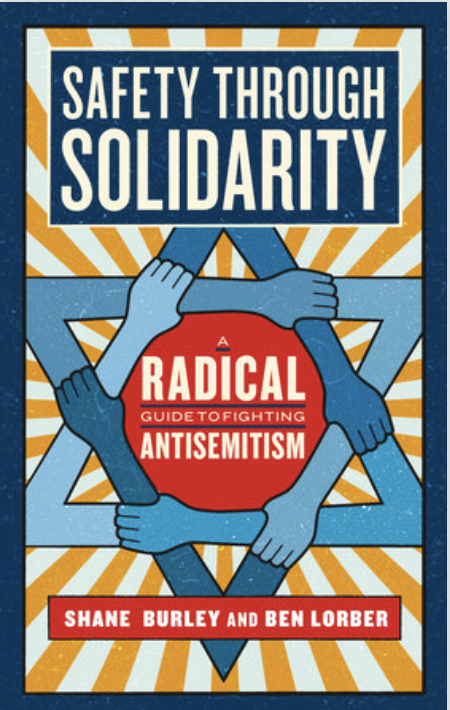
This talk by the incredible Dove Kent
And I hardly remember what I said (and can't stand watching myself to find out), but it was a conversation about antisemitism with the wonderful Dr. Simran Jeet Singh:
[[1]]: During this time, the Jewish-Christian breakup is happening in earnest. Lots to say about this, but tl;dr Jesus-following Jews were probably just another Jewish group just running around Second Temple Judea for a while, there was a significant communal overlap between them and other Jews before and after the Destruction, all these bullet points lead to tensions rising, and probably the breakup was well and truly done by the Bar Kochba Revolt.
[[2]]: There's a three-part series on Jesus' Jewishness at the end of this post. Have at it, friends. But finish reading this one first, ya?
[[3]]: Again, another day, we'll look at Jews and the concept of "peoplehood," conditional whiteness intersecting with race as a construct in Europe vs antiblackness in the US and etc. But yes, Jews were one, but not the only, major racial/ethnic "other" in Europe for a good chunk of the last couple of thousand years.
[[4]]: In many parts of Europe, Jews were often arrested and held for ransom, executed on both real and trumped-up charges, and often eventually massacred or expelled as a way of forcibly cancelling debts.
[[5]]: Christian nationalism asserts that the U.S. is a Christian nation and that the country's laws should therefore be rooted in Christian values. Though I'm fixing these footnotes in July, 2025, and, well, yeah.
(Semi-) RELATED POSTS:
The Red Heifer, Christian Zionism, and the Dangers Of NowHow a Holy Cow encapsulates an unholy zealot alliance Jesus and the Jews: Part OneThe first of a 3-part series on the Gospels and Jewish text
Jesus and the Jews: Part OneThe first of a 3-part series on the Gospels and Jewish text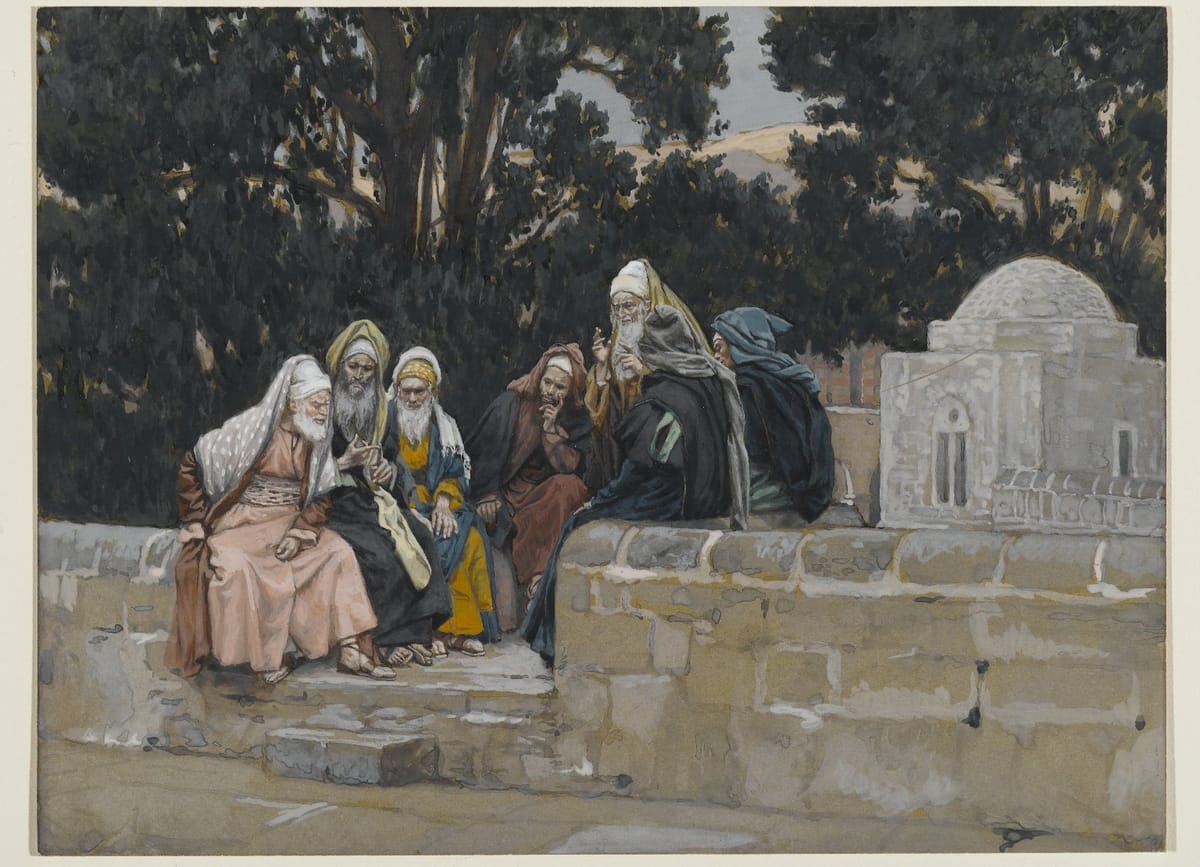 Jesus and Beit Hillel (Part 2!)And Matthew 23. Let’s have a look.
Jesus and Beit Hillel (Part 2!)And Matthew 23. Let’s have a look. Wrapping up JesusA sample platter of Gospel x Rabbinics mashups
Wrapping up JesusA sample platter of Gospel x Rabbinics mashups Jews, Gender and AssimilationRoots! Tropes! Tensions!
Jews, Gender and AssimilationRoots! Tropes! Tensions!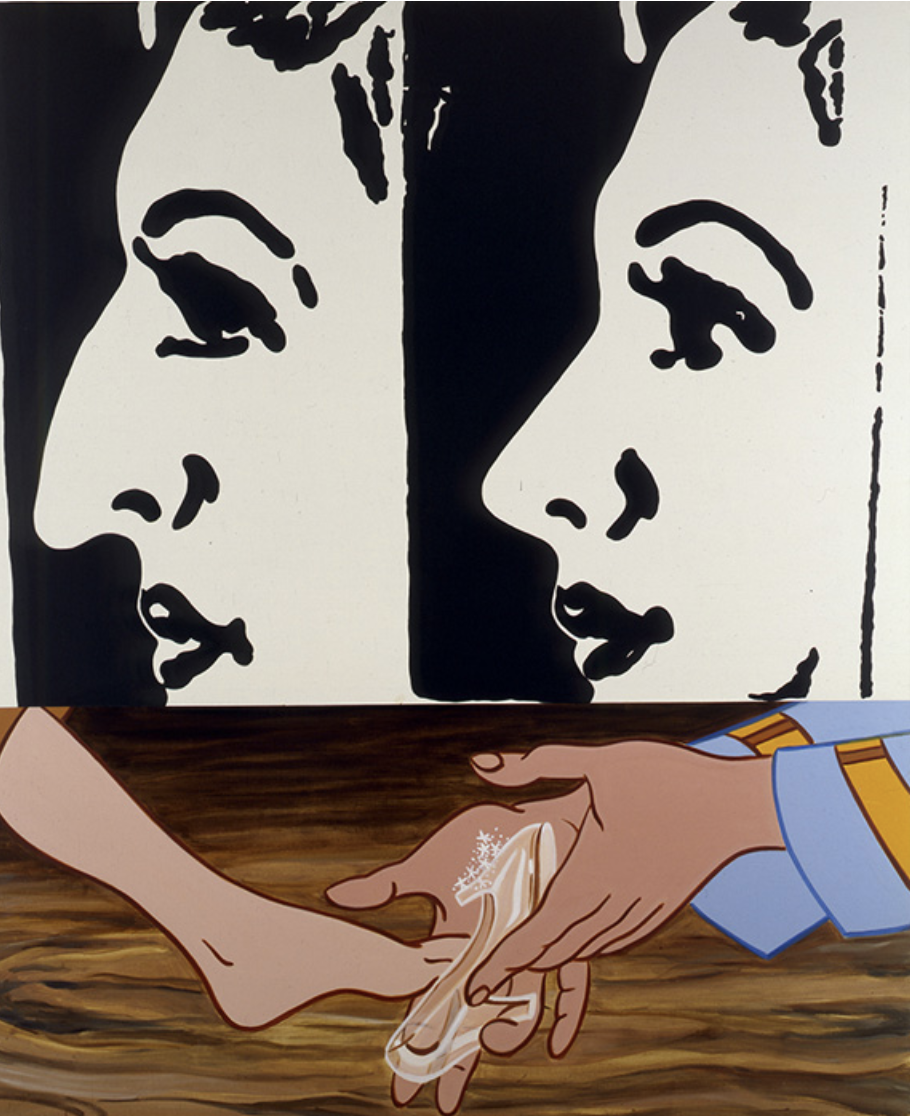 Jews and Colonialismtell every truth, push your understanding of power
Jews and Colonialismtell every truth, push your understanding of power












